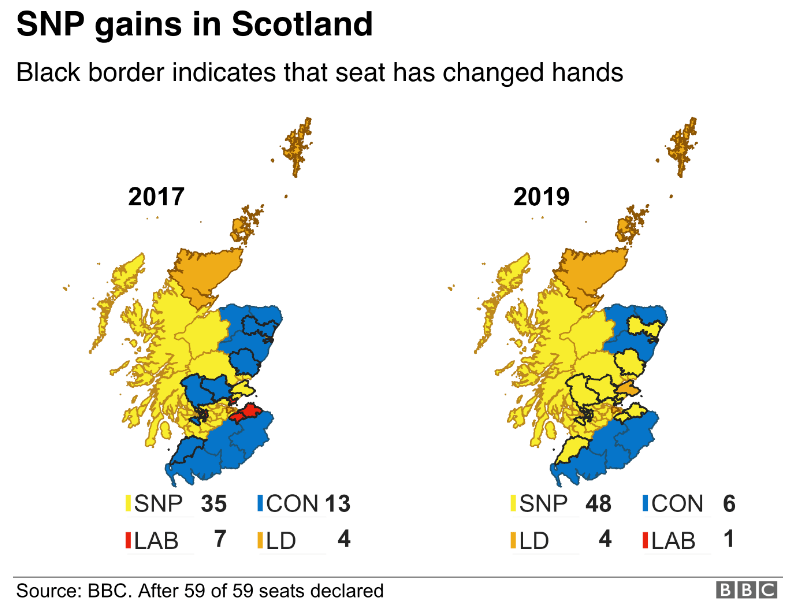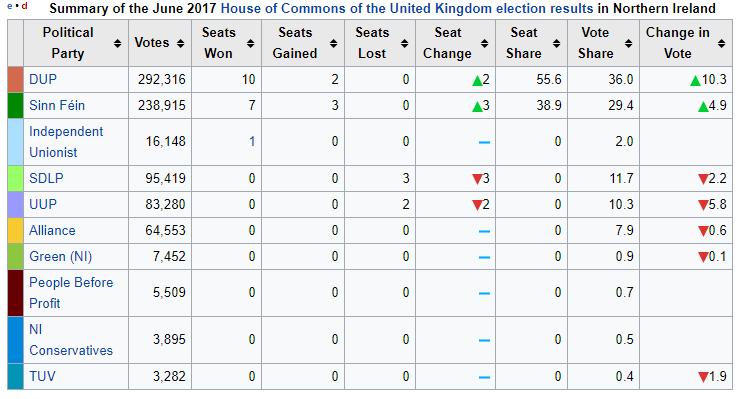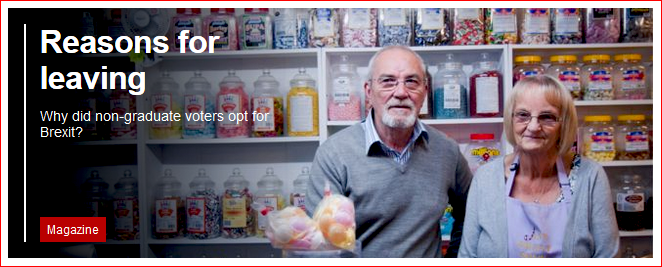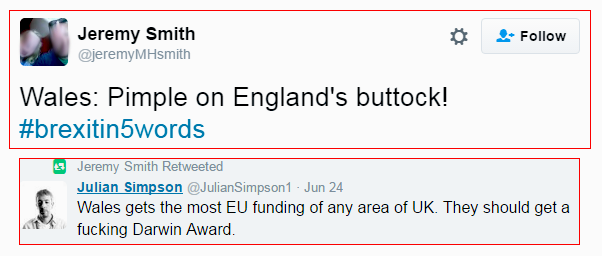PLEASE APPRECIATE THAT I GET SENT MORE INFORMATION AND LEADS THAN I CAN USE. I TRY TO RESPOND TO EVERYONE WHO CONTACTS ME BUT I CANNOT POSSIBLY USE EVERY BIT OF INFORMATION I’M SENT. DIOLCH YN FAWR
♦
![]() Well, what an election that was, for all sorts of reasons. I shall start this analysis with a quick look around the other countries before homing in on Wales.
Well, what an election that was, for all sorts of reasons. I shall start this analysis with a quick look around the other countries before homing in on Wales.
◊
NORTHERN IRELAND
If we are to believe the BBC then the results were bad for both major parties, the Democratic Unionist Party and Sinn Féin. Certainly SF lost Foyle (Derry) but it was to the nationalist Social Democratic and Labour Party. To compensate, the party won North Belfast, where Belfast Lord Mayor John Finucane triumphed.
John Finucane was just a lad in 1989 when Loyalist assassins burst into the family home and killed his solicitor father, Pat. Loyalist killers controlled by MI5.
Yes, votes for both Sinn Féin and the Democratic Unionist Party were down but it was the DUP that lost (in total) two seats, not SF. The cross-community Alliance Party won North Down, and in addition to Foyle the SDLP won Belfast South.
For someone who remembers the Troubles – and even the time before the Troubles – it’s quite amazing how politics has changed in the Six Counties.
Until the Reverend Dr Ian Paisley formed the DUP in 1971 the Ulster Unionist Party dominated the political scene, and it wasn’t until 2004 that the DUP became the largest Unionist party in terms of seats at Stormont and in Westminster. Now the UUP has no MPs and got just 11.7% of the vote last week, but even that was an improvement of 1.4% on 2017.

On the other side, the similarly hegemonic SDLP has been eclipsed by a party that until quite recently was dismissed by the British media as the mouthpiece of the IRA. I can recall when we weren’t allowed to actually hear SF spokespersons – we could see them, and see their lips move, but the words had to be spoken by actors!
That was one of the more bizarre episodes in British broadcasting history. If we were allowed to hear what they said but not them say it, then I can only conclude that we were being protected from the harsh Ulster accent.
Northern Ireland, with more Republican/Nationalist MPs than Unionist MPs, plus one MP representing a party that is neutral on the border, and with Brexit thrown into the mix, is probably moving towards a referendum on Irish reunification.
For this debate is no longer framed by tribal loyalties. The old Protestant-Unionist objections to unifying with a poor, ‘priest-ridden’ country to the south are gone. The Republic today is both more liberal and richer than the North. What’s more, it’s in the EU, and Northern Ireland voted to Remain.
In any future referendum it will not just be Republicans and Nationalists voting for reunification, it will also be members of the Protestant middle class, business people and, especially, the young.
◊
SCOTLAND
The headline result is of course that the SNP ‘won’ the election with 48 out of Scotland’s 59 seats. Though as we know, Boris Johnson has already refused to allow a second independence referendum, so how might events unfold?
Some suggest that the Tory government in London should play the SNP like a fish, paying out a little line (concessions), then reeling in (refusal) . . . until its energy is exhausted and it can be ‘landed’ (accepts no referendum).
Basically, faffing about in the kind of way that would suit Johnson perfectly.
An interesting metaphor that ignores too many unavoidable pitfalls and a number of imponderables.

First, there’s ‘Getting Brexit done’, which served as Johnson’s mantra throughout the recent election campaign. Yet 62% of Scots and every single council area voted against leaving the European Union. That is a fact that cannot be changed – Scotland voted by a large majority to remain in the EU.
Which means that in fulfilling this election pledge he cannot possibly renege on Johnson will further antagonise many Scots. Even some of those who voted Leave but now wish to respect the majority vote.
Then there’s the Scottish parliamentary elections of May 2021. If London proves obstructive and the SNP turns this election into a mandate for independence we could enter a Catalonia-style morass. God knows where that might lead.
Another imponderable is how Labour supporters might vote in a referendum. They’ll be confronted with a choice between independence and Tory rule. Some will choose independence. How many take this option could prove decisive.
Then there are those who voted Leave but want independence, and may have lent their votes to the Tories last week in order to ‘Get Brexit done’. How many of these are there?
Imponderables aside, four fundamental facts are unavoidable:
1/ The SNP has won a massive victory.
2/ Consequently, the Tory government in London has no mandate to rule Scotland.
3/ Scotland voted to remain in the European Union.
4/ Consequently, London has no mandate to take Scotland out of the EU against its will.
Looking beyond the SNP – difficult given how it dominates the scene – we see that once-mighty Labour is reduced to a single seat, Edinburgh South. The Liberal Democrats are holding on to Orkney and Shetland, Caithness, Sutherland and Easter Ross in the far north, Edinburgh West and Fife North East.
The last of those is interesting because the SNP held this seat by just two votes, the smallest majority in the House of Commons. This time around the anti-SNP vote piled in behind the Lib Dem again and pushed Wendy Chamberlain over the winning line with a majority of 1,316.
Though the Lib Dem’s UK leader, Jo Swinson, she who had talked of becoming prime minister not so long ago, narrowly lost her Dunbartonshire East seat to the SNP.
Elsewhere, the Tories, who had been shaping up to become the natural home for Unionist votes lost seven seats to bring their total down to six. Given that they now hold large, rural constituencies (especially the three along the border) this means that the map gives a somewhat inflated view of Tory support.
Though it should be remembered that in all six Conservative seats the SNP is second, sometimes just a few hundred votes behind.

Sometimes a party’s share of the vote can tell as much if not more about its overall performance than the number of its MPs. The figures for Scotland make poor reading for Unionists in general and for the new government in London in particular.
‘Getting Brexit done’ may have worked as a slogan in England, and Wales, but it seems to have had the opposite effect in the land that gave us the very word sluagh-ghairm. Which is perfectly understandable given that Scotland voted Remain.
With its separate legal and education systems, with the Kirk, with its banks and different banknotes, Scotland always was a different country. Soon it might be a very different country.
Whatever happens, we can guarantee that the greater the prospect of Scottish independence the dirtier the British state will play. And it certainly played dirty in the 2014 independence referendum campaign. Explained in this remarkable video, London Calling: BBC bias during the 2014 Scottish independence referendum.
I urge you to set aside an hour of your time over Christmas to watch it. Those you’ll see in the film are not wild-eyed conspiracy theorists, these are people who know the score. On the plus side, the BBC is now so discredited that it could never again play the influential role it played in 2014.
Scotland will soon regain the independence that was surrendered in 1707 by an unrepresentative parliament whose members had been bullied or bribed into supporting the Act of Union.
As Robert Burns put it: Such A Parcel Of Rogues In A Nation.
◊
ENGLAND
Reporting of the election in England was dominated by words like ‘landslide’ and talk of crumbling ‘red walls’. The reality is rather more nuanced, and disturbing for anyone wanting cultural harmony and social cohesion.
The truth is that in England the Conservative share of the vote increased by just 1.7% on 2017. The real story is the collapse of the Labour vote, down 8.0% on 2017. The Liberal Democrats were up 4.6%, the Brexit Party 2.0%, and the Greens 1.2%.
But if we look behind those bare figures we find where and why the Tories did so well. Those areas of the Midlands and the North that voted Leave in June 2016 saw the Tory vote increase substantially, while Remain areas saw the Tory vote go down.
The problem for Labour was that they lost out in both. That’s what happens to ditherers.

The cities remain Labour, especially London; which meant that in the Midlands and the North the cities and conurbations did not collapse with the rest of the ‘red wall’. The West Midlands conurbation remained largely Labour, as did Merseyside, and Manchester, Sheffield, the Leeds-Bradford conurbation, plus Hull, while in the north east – Sedgefield and Blyth Valley not withstanding – Labour holds a swathe of seats from Newcastle upon Tyne North all the way down to Middlesbrough.
It is the smaller towns and cities, the former mining districts, that will be represented by Conservative MPs for the next few years. Without doing an in-depth check it looks to me as if Stoke on Trent was the largest English city to ‘defect’.

So why did Manchester and Birmingham stay Labour while Bury, Scunthorpe, Dewsbury, Wakefield and many similar towns go Conservative? Almost certainly because the major cities of the Midlands and the North share certain features with London that make them more challenging for the Tories.
These features are:
1/ A generally younger population, with many students.
2/ Large immigrant populations plus settled ethnic minority communities.
3/ The presence of a ‘progressive’ middle class.
4/ More diversified economies that have coped with recession better than coalfield areas and towns built on a single industry.
5/ They attract more investment.
Which results in the rich and poor of England linking arms and facing off against those in between. Which is a strange thought, because for the greater part of the twentieth century politics in England split along class lines, a division that pitted Tory-voting shires and suburbs against Labour voting cities and industrial regions.
Going further back, to the nineteenth century, it was the new industrialists and others – through the Liberal Party – that represented the interests of the lower orders against the Oxbridge-educated Establishment of aristocracy, landowners, bankers, Church of England, army, civil service.
But last Thursday we entered a new paradigm. When so many people on the minimum wage are prepared to vote Tory then you know something has changed.
Students of politics will immediately recognise the parallels with the USA, where Donald Trump managed to get support from the richest sectors of US society and some of the poorest. Leaving the Democrats with a minority of the white working class supplemented by ethnic minorities, immigrants, and white liberals.
Brexit may have brought these US divisions into sharper focus in the UK but they would be there even without a debate over EU membership. People in the ‘neglected’ areas might have voted Tory last Thursday even without Brexit.
I say that because another reason they voted Conservative was because Labour, the party they once regarded as theirs, has drifted away, hijacked by the hard left, the detested metropolitan elite, and others who look down on them and regard their patriotism with revulsion.

As Jon Sopel, the BBC’s North American editor put it in this article (which is well worth reading): ‘Labour in the UK lost the working class, but gained the woke. And that will give the party sleepless nights over the coming months and years.’
Labour lost the election because it has alienated too many of the patriotic white working class. An as yet unquantifiable percentage of which might be mopped up by whatever party Nigel Farage comes up with next.
◊
WALES
Let’s be brutally frank, there were just two things that saved ‘Welsh’ Labour from a worse kicking last Thursday.
The first was the terror felt by too many in the region twixt Blaenafon and Kidwelly at the prospect of rotating grandparents in the graveyards of Salem, Jerusalem, and yea! even Caersalem.
The second was the absolute fucking uselessness of Plaid Cymru. Because if Jon Sopel is right, about the Labour Party in England, then here in Wales the woke have become Plaid Cymru.
Yes, I know, Plaid held its four seats . . . and failed to come second in any of the other seats it contested. Leaving Plaid Cymru in serious danger of becoming a regional party within a small country, representing a constituency that is rural and largely Welsh speaking in an urbanised and largely anglophone country. Now there’s a party with a future!
Though, in fairness, Plaid Cymru has tried to break away from the ‘rural, Welsh-speaking’ strait-jacket. Unfortunately, rather than appealing to patriotic English speakers in the cities and towns the party allowed (encouraged?) the takeover by socialists who tar any critic with the ‘fascist’ brush, and those who insist that anyone who doesn’t accept a man with a penis as a woman is a ‘transphobe’.

Then, before the election, Plaid’s strategists (don’t laugh!) decided that it would be a splendid idea to go into a Remainer pact in a few seats with the Liberal Democrats and the Green Party of Englandandwales. In a country that voted Leave!!
This is why, last Thursday, when presented with the open goal of a Labour Party in chaos, a Conservative Party made untouchable by the fear of spinning sounds from the local boneyard, and the Lib Dems led by a delusional woman, Plaid Cymru’s vote actually fell, in real and percentage terms!
The only consolation is that Plaid Cymru is probably finished. No party with such limited appeal, making such disastrous decisions, is entitled to any future. What’s worse, in Plaid’s four seats the party’s supporters are social conservatives of the kind despised by those who now control the party. How long can this misalliance last?
Maybe it would be best for Plaid Cymru to drop the pretence that it’s a mainstream party and rebrand itself as the loony left party it has become. This would allow the emergence of another national party on the right to represent the ‘fascists’ and the ‘transphobes’, the patriots and those who’d like to build up an indigenous economy rather than rely on a begging-bowl variant of devolution.
At heart, Plaid Cymru is a Devo Max party securing the maximum number of careers, sinecures, peerages, etc., for those it represents, within the colonial system. Which means having enough power to indulge its lunacies without the responsibility of having to fund any of it.

But things are not looking too good for this model of devolution at the moment. For a start, Labour is in deep and serious trouble on a UK level and this might extend to the 2021 Assembly elections, with Plaid Cymru in no position to keep the gravy train on the tracks.
Who’s to say the Tories won’t win an outright majority in 2021?
Worse, Plaid Cymru’s obvious weaknesses coupled with Labour’s self-destruction might encourage the new Conservative government to undermine or do away entirely with devolution.
At the very least, London could take more control over funding. An article by Martin Shipton dealt with this possibility in Saturday’s Llais y Sais. Here’s a link to the WalesOnline version, with a clip from it below.

Now picture the scene . . . Boris Johnson rocks up in Swansea (or it could be Wrexham, Merthyr, Blaenau Ffestiniog or Pembroke) and says, ‘Now listen chaps, I can see that with this bally devolution most of the moolah stays in Cardiff, and that’s jolly unfair. In future, the Bozmeister will dish out the goodies himself – and I guarantee that it will be fair shares for all!’
This will of course result in demonstrations in all corners of the land defending the status quo, demanding that the money be given to the ‘Welsh Government’ . . . for it to divert into the poverty racket (third sector, to you). I foresee hastily-scribbled placards being borne aloft insisting that even spads and lobbyists have to eat.
Yes, I’m joking.
But it won’t be BoJo undermining devolution. Labour and Plaid Cymru, plus their parasite friends down Corruption Bay and elsewhere, have already done the job for him, to the point where few would put up much of a fight if the Tories tried to do away with devolution altogether.
Devolution has been an abysmal failure because nobody wanted to make it work for anyone but themselves. Nobody in London or Cardiff.
◊
CONCLUSION
I have chosen to look at all the countries of the United Kingdom because while the Tories’ campaign was all about getting Brexit done, everyone knows that achieving that objective will jeopardise the unity of the state.
I have argued since the EU referendum in 2016 that Brexit and the chaos it could unleash, the knock-on effects in Scotland and Ireland, would offer great advantages to Wales if we only had the sense and the determination to seize them.
But for Wales to capitalise on these opportunities we need politicians, and political parties or movements that want Wales to be a country that benefits the Welsh, rather than a haven for retirees, refugees, colonists, third sector parasites and ‘investors’ looking for easy money.
But I’m deeply pessimistic; for this election suggests that Wales will be in no position to take advantage of the opportunities coming our way. We shall just drift towards assimilation.
♦ end ♦


































